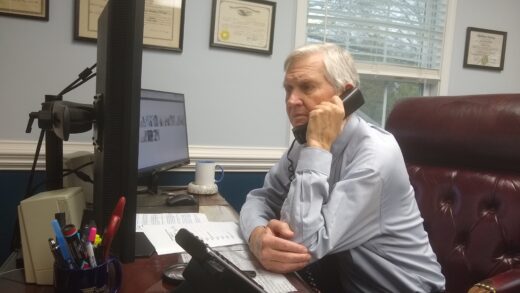One of the greatest challenges lawyers face is correcting problems created by the ignorance of pro se litigants. This is usually far more expensive than if both parties had lawyers from the beginning and–despite the expense–is far less successful.
While I was not a good student, I loved my three years of law school at the University of South Carolina. Since then, I work most Saturdays, Sundays, and holidays. I spend hours each week reading recent appellate opinions from South Carolina, the American Bar Association Journal, South Carolina Lawyer, and TechnoLawyer. I read how-to-do-it books by other lawyers on practice and procedure so I can become a better lawyer. I spend much time in legal research for both my clients and my own professional development. As hard as I work, I still make mistakes and understand I have a lot to learn.
Lawyers know Abraham Lincoln got it right when he said, “He who represents himself has a fool for a client.” This is true even for lawyers. When I have a legal problem, I hire a lawyer. I hired a lawyer for a contested domestic case and another lawyer for an uncontested divorce. If I sue a client for a fee, I hire a lawyer to do it. When Erin and I formed an LLC for our partnership, we hired lawyers to represent us. I hired a lawyer to prepare my will and my health care power-of-attorney. My experience is most lawyers hire lawyers for legal issues.
Many clients and laypersons think the law is objective and black and white. It is not. The law is subjective, gray, murky, and changing. A word or phrase means one thing in one context and something entirely different in another.
Pro se litigants who prepare contracts, wills, powers-of-attorney, or other legal documents from the internet insult the legal profession. Those who file pro se litigation and appear pro se in court are even worse. These people walk into the legal system as Mr. McGoo walks into the minefields of life, though most do not have Mr. McGoo’s good luck.
The major practical problem of dealing with a pro se litigant, is the ethical prohibition of providing legal advice to an unrepresented opposing party. If I have a lawyer on the other side, I can talk about the law, my interpretation of the law, and why I believe a judge will do this or that. With a pro se litigant, I can only say, “The only legal advice I can ethically give you is to consult your own lawyer.” This constraint makes settlement difficult or impossible.
Maybe I should take the advice of Lord Neaves, stop being annoyed by pro se litigants, and reap the economic benefits of the problems they create.
The Jolly Testator Who Makes His Own Will
Lord Neaves
Ye lawyers who live upon litigants’ fees,
And who need a good many to live at your ease,
Grave or gay, wise or witty, whate’er your degree,
Plain stuff or Queen’s Counsel, take counsel of me:
When a festive occasion your spirit unbends,
You should never forget the profession’s best friends;
So we’ll send round the wine, and a light bumper fill
To the jolly testator who makes his own will.
He premises his wish and his purpose to save
All dispute among friends when he’s laid in the grave;
Then he straightway proceeds more disputes to create
Than a long summer’s day would give time to relate.
He writes and erases, he blunders and blots,
He produces such puzzles and Gordian knots,
That a lawyer, intending to frame the thing ill,
Couldn’t match the testator who makes his own will.
Testators are good, but a feeling more tender
Springs up when I think of the feminine gender!
The testatrix for me, who, like Telemaque’s mother,
Unweaves at one time what she wove at another;
She bequeaths, she repeats, she recalls a donation,
And ends by revoking her own revocation;
Still scribbling or scratching some new codicil,
Oh! success to the woman who makes her own will.
‘Tisn’t easy to say, ‘mid her varying vapors,
What scraps should be deemed testamentary papers.
‘Tisn’t easy from these her intention to find,
When perhaps she herself never knew her own mind.
Every step that we take, there arises fresh trouble:
Is the legacy lapsed? Is it single or double?
No customer brings so much grist to the mill
As the wealthy old woman who makes her own will.
I do not own one, but my favorite coffee cup from Amazon says, “Please Do Not Confuse Your Google Search with My Law Degree.”


